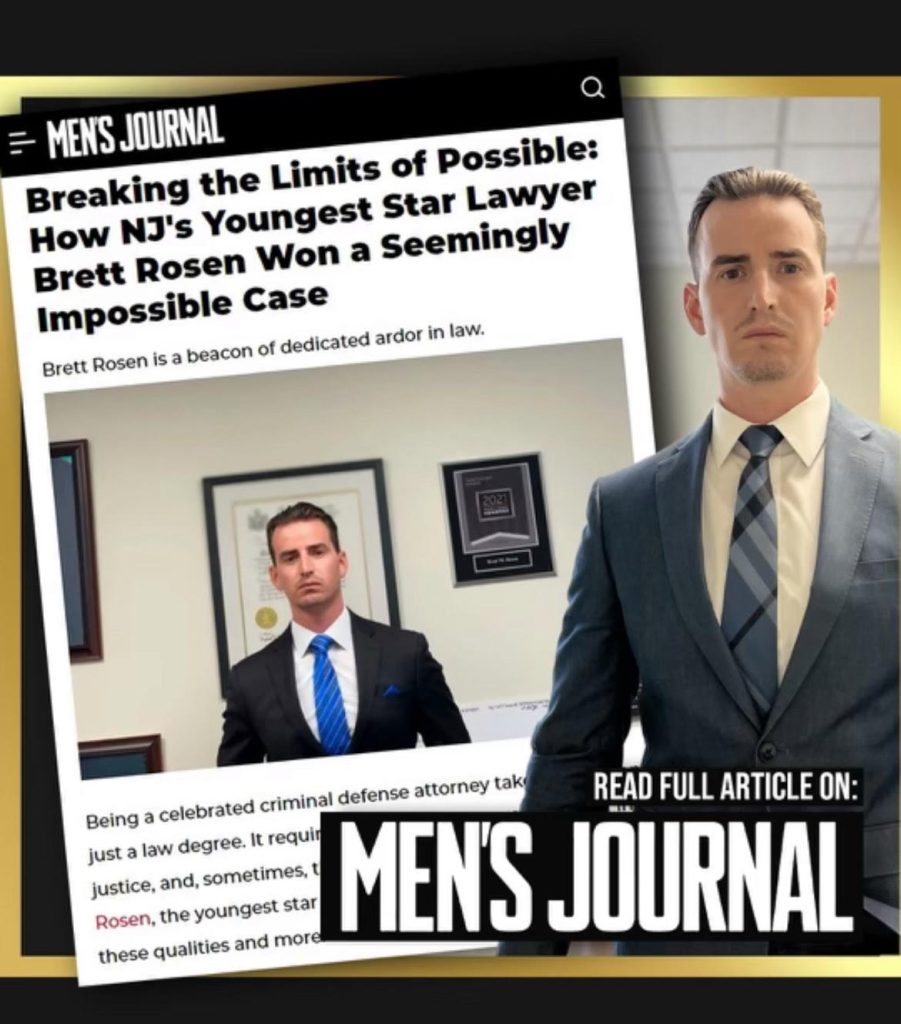Can the Prosecutor Waive a Juvenile to Adult Court in New Jersey? A Comprehensive Guide by Brett M. Rosen, Esq.
Waiving a Juvenile to Adult Court in New Jersey

Can the Prosecutor Waive a Juvenile to Adult Court in New Jersey?
When a juvenile is accused of a crime in New Jersey, the case typically begins in the family court system, which focuses on rehabilitation rather than punishment. However, in certain circumstances, the prosecutor has the power to “waive” a juvenile to adult court, where they will be tried and potentially sentenced as an adult. This is a serious decision with significant consequences for the juvenile’s future. This comprehensive guide will delve into the complexities of juvenile waiver in New Jersey, providing valuable insights and legal guidance to help you understand your rights and options if you or your child is facing this situation.
Secure Your Defense
Brett M. Rosen, Esq. is a highly respected and accomplished criminal defense attorney based in Elizabeth, New Jersey. He is widely recognized for his expertise, dedication, and aggressive representation of clients facing a wide range of criminal charges in both state and federal courts.
Here’s what distinguishes Brett M. Rosen as a top criminal defense attorney:
- Extensive Experience: He has a proven track record of successfully defending clients against various charges, including DUI/DWI, drug crimes, assault, theft, domestic violence, weapons offenses, white-collar crimes, and federal offenses.
- Certified Criminal Trial Attorney: He holds the prestigious certification by the Supreme Court of New Jersey as a Criminal Trial Attorney, a distinction held by less than 1% of attorneys in the state. This certification underscores his exceptional knowledge and skill in criminal trial law.
- Licensed in Two States: He is licensed to practice law in both New Jersey and New York, expanding his reach and ability to assist clients in both states.
- High-Profile Cases: He has represented numerous high-profile individuals, including celebrities and a Grammy Award-winning artist, demonstrating his ability to handle complex and sensitive cases with discretion and effectiveness.
- Passionate Advocate: He is known for his passionate advocacy, unwavering dedication to his clients, and assertive courtroom presence. He is skilled at telling compelling stories and conducting effective cross-examinations to challenge the prosecution’s case.
- Client-Focused Approach: He prioritizes his clients’ needs and well-being, offering 24/7 availability to ensure they receive the support and guidance they need throughout the legal process.
- Recognition and Awards: He has received numerous accolades and recognition for his legal work, including being named one of the top criminal defense attorneys of 2023 and being selected to the Thomson Reuters Super Lawyers Rising Stars list for six consecutive years.
Beyond the Credentials:
Brett M. Rosen is not just a skilled attorney; he is also dedicated to fighting for the underdog and ensuring everyone has access to quality legal representation. He believes in building strong relationships with his clients based on trust, open communication, and a shared commitment to achieving the best possible outcome. Call him today for a free consultation at 908-312-0368 or by email at brett@nynjcriminalcivilesq.com.
Understanding Juvenile Waiver in New Jersey
Juvenile waiver, also known as transfer to adult court, is a legal process that allows a juvenile offender to be prosecuted in the adult criminal justice system. While New Jersey law (New Jersey Code of Criminal Justice (N.J.S.A. 2A:4A-26)) generally favors treating juveniles differently than adults, recognizing their immaturity and potential for rehabilitation, there are instances where the severity of the offense or the juvenile’s history warrants a more serious approach.
Key Factors in Juvenile Waiver:
The decision to waive a juvenile to adult court is based on several factors, including:
- Age: The juvenile must be at least 14 years old at the time of the alleged offense to be eligible for waiver.
- Offense: The offense must be a serious crime, such as murder, aggravated sexual assault, armed robbery, or other violent felonies.
- Prior Record: The juvenile’s prior record of delinquency can be a factor in the waiver decision.
- Public Safety: The prosecutor must demonstrate that waiving the juvenile to adult court is necessary to protect public safety.
The Waiver Process
The process of waiving a juvenile to adult court in New Jersey involves several steps:
Prosecutor’s Motion: The prosecutor initiates the process by filing a motion to waive the juvenile to adult court. This motion must include evidence supporting the waiver, such as the nature of the offense, the juvenile’s prior record, and any other relevant factors.
Probable Cause Hearing: The court holds a probable cause hearing to determine whether there is sufficient evidence to believe that the juvenile committed the alleged offense. This hearing is not a trial; the judge only needs to find probable cause, not proof beyond a reasonable doubt.
Waiver Hearing: If probable cause is found, the court then holds a waiver hearing to determine whether the juvenile should be waived to adult court. The prosecutor must prove that the nature and circumstances of the offense and the juvenile’s prior record are serious enough to warrant waiver. The juvenile’s attorney can present evidence and arguments against waiver.
Court’s Decision: The judge considers all the evidence and arguments presented at the waiver hearing and makes a decision on whether to grant the waiver. The judge must provide written reasons for their decision.
Transfer to Adult Court: If the waiver is granted, the juvenile’s case is transferred to the adult criminal court, where they will be prosecuted and potentially sentenced as an adult.
Possible Outcomes of the Waiver Hearing
After considering the evidence and arguments, the judge will make a decision on the waiver motion. There are three possible outcomes:
- Waiver Granted: If the judge grants the waiver, the case is transferred to adult criminal court, where the juvenile will be tried as an adult.
- Waiver Denied: If the judge denies the waiver, the case remains in the juvenile justice system.
- Conditional Waiver: In some cases, the judge may grant a conditional waiver, where the case is initially transferred to adult court but can be returned to the juvenile system if the juvenile meets certain conditions, such as completing a rehabilitation program.
Defenses to Juvenile Waiver
An experienced criminal defense attorney can raise various defenses to fight juvenile waiver, including:
- Challenging Probable Cause: Arguing that there is insufficient evidence to support the charges against the juvenile.
- Minimizing the Offense: Presenting evidence to mitigate the severity of the offense or the juvenile’s role in the crime.
- Highlighting Rehabilitative Potential: Emphasizing the juvenile’s potential for rehabilitation within the juvenile justice system.
- Addressing Procedural Errors: Identifying any procedural errors or violations of the juvenile’s rights that may have occurred during the waiver process.
- Presenting Mitigating Factors: Presenting evidence of mitigating factors, such as the juvenile’s age, maturity level, mental health, or family circumstances, that may weigh against waiver.
Consequences of Waiver to Adult Court
If a juvenile is waived to adult court, they face the same potential penalties as an adult, including:
- Incarceration in Adult Prison: If convicted, the juvenile may be sentenced to serve time in an adult prison, where they are at increased risk of violence and abuse.
- Permanent Criminal Record: A conviction in adult court will result in a permanent criminal record, which can have long-term consequences for employment, education, and housing opportunities.
- Harsher Sentencing: Adult courts generally impose harsher sentences than juvenile courts, even for the same offense.
- Limited Rehabilitation Opportunities: Adult prisons often have limited resources for rehabilitation and education, making it more difficult for juveniles to turn their lives around.
FAQs about Juvenile Waiver in New Jersey
- Can a juvenile request to be waived to adult court?
While it is rare, a juvenile can request to be waived to adult court. However, the court will still consider the same factors in making its decision.
- What are some examples of offenses that may lead to juvenile waiver?
Offenses that may lead to juvenile waiver include murder, aggravated sexual assault, armed robbery, kidnapping, carjacking, and aggravated arson.
- What happens if a juvenile is not waived to adult court?
If the waiver is denied, the juvenile’s case remains in the family court system, where the focus is on rehabilitation and providing services to address the underlying causes of the delinquent behavior.
- Can a juvenile’s case be transferred back to juvenile court after being waived to adult court?
In some cases, a judge in adult court may decide to transfer the case back to juvenile court if it is determined that the juvenile is amenable to treatment in the juvenile justice system.
- What should I do if my child is facing juvenile waiver?
It is crucial to contact an experienced criminal defense attorney immediately. An attorney can protect your child’s rights, challenge the waiver motion, and fight to keep the case in the juvenile justice system.
Additional FAQs
- Can a juvenile be waived to adult court for any offense?
- No, only certain serious offenses are eligible for waiver, typically violent crimes or offenses involving weapons.
- What is the youngest age a juvenile can be waived to adult court?
- A juvenile must be at least 14 years old at the time of the alleged offense to be eligible for waiver.
- What are the benefits of remaining in the juvenile justice system?
- The juvenile justice system focuses on rehabilitation and provides various programs and services to help juveniles change their behavior and avoid future criminal activity.
- What happens if a juvenile is waived to adult court and then found not guilty?
- Even if found not guilty in adult court, the juvenile’s record will still reflect the arrest and charges. However, in New Jersey if the juvenile is found not guilty the Judge must order a expungement of the juvenile’s arrest and charges.
- What are the differences between the juvenile and adult criminal justice systems?
- The juvenile justice system focuses on rehabilitation and provides more lenient sentencing options. The adult system focuses on punishment and deterrence and has harsher penalties.
Why Choose Brett M. Rosen, Esq. for Juvenile Waiver Cases?

Juvenile waiver cases are complex and require a skilled and experienced defense attorney. Brett M. Rosen, Esq. has a deep understanding of New Jersey juvenile law and a proven track record of success in defending juveniles facing waiver to adult court. He will:
- Conduct a thorough investigation of the charges and the evidence against your child.
- Develop a strong defense strategy tailored to your child’s specific circumstances.
- Challenge the prosecutor’s waiver motion at every stage of the proceedings.
- Negotiate with the prosecutor to seek a favorable resolution.
- Provide compassionate and effective representation in court.
If your child is facing juvenile waiver in New Jersey, contact Brett M. Rosen, Esq. today for a free consultation. He is available 24/7 to discuss your case and provide expert legal guidance.
908-312-0368 & brett@nynjcriminalcivilesq.com
Disclaimer: This information is for informational purposes only and should not be considered legal advice. It is essential to consult with an attorney to discuss your specific legal situation.
